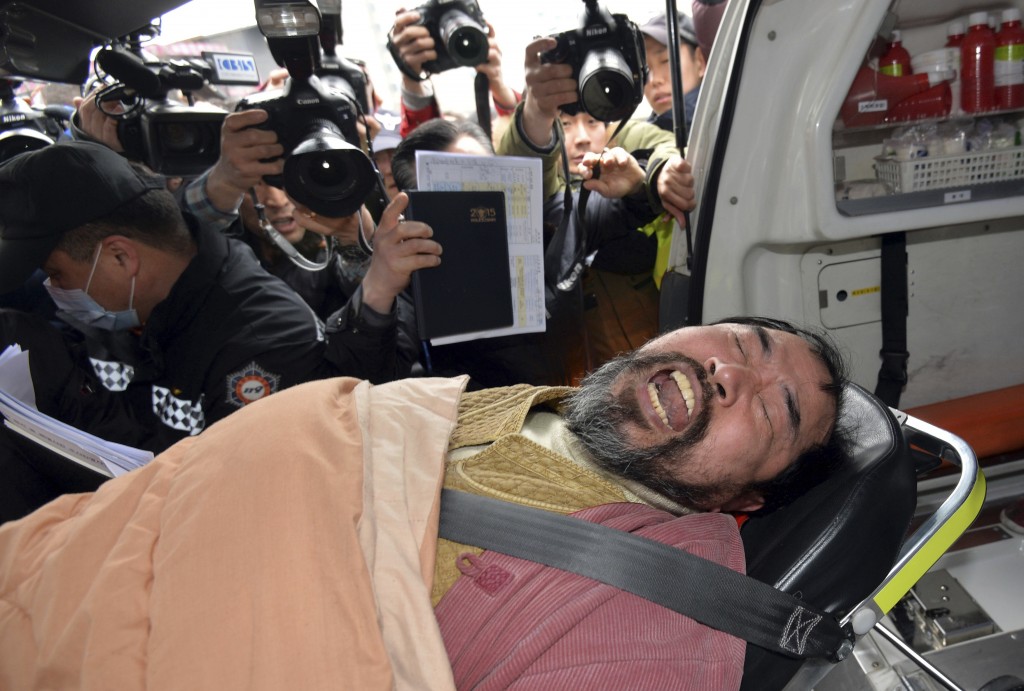- California Assembly OKs highest minimum wage in nation
- S. Korea unveils first graphic cigarette warnings
- US joins with South Korea, Japan in bid to deter North Korea
- LPGA golfer Chun In-gee finally back in action
- S. Korea won’t be top seed in final World Cup qualification round
- US men’s soccer misses 2nd straight Olympics
- US back on track in qualifying with 4-0 win over Guatemala
- High-intensity workout injuries spawn cottage industry
- CDC expands range of Zika mosquitoes into parts of Northeast
- Who knew? ‘The Walking Dead’ is helping families connect
Attacker faces grave charges, including attempted murder

A suspect, identified by police as 55-year-old Kim Ki-jong, is carried on a stretcher off an ambulance as he arrives at a hospital in Seoul, South Korea, Thursday, March 5, 2015. Lippert was in stable condition after a man screaming demands for a unified North and South Korea slashed him on the face and wrist with a knife, South Korean police and U.S. officials said Thursday.(AP Photo/Yonhap, Han Jong-chan)
SEOUL, March 6 (Yonhap) — A 55-year-old South Korean activist was taken into custody Friday on charges of attempting to murder the top U.S. diplomat in Seoul.
Kim Ki-jong also faces charges of violence against a foreign envoy and business obstruction in the shocking attack on U.S. Ambassador to South Korea Mark Lippert the previous day.
Wielding a 25-centimeter fruit knife, Kim slashed the ambassador five times at a performance hall in downtown Seoul where the envoy was to give a speech. The wounds weren’t life-threatening, but the attack left a deep gash extending from the envoy’s right chin to cheek, requiring more than 80 stitches.
The Seoul Central District Court issued an arrest warrant for Kim, saying “The reason and the necessity of his arrest were fully explained.”
Before entering the court for a hearing to review the legality of his arrest, Kim said he had no ties to North Korea.
“That’s nonsense,” he told reporters when asked about the police investigation into the possibility.
He denied being sympathetic to Pyongyang and having ever been to the country despite police announcements earlier to the contrary.
He also shook his head when asked if he had an intent to kill and said there was no one else involved.
Kim had previously told police officers that he plotted the attack to stop the Key Resolve and Foal Eagle exercises that kicked off earlier this week.
The exercises are part of Seoul and Washington’s efforts to better deter threats from North Korea. Kim said he thought the drills hampered efforts to re-unify the two Koreas as they remain technically at war since the Korean War in the 1950s ended in an armistice, not a peace treaty.
Hwang Sang-hyeon, Kim’s attorney, also said the attack was not premeditated.
In mid-February, Kim received a letter of invitation from the organizer, and it was then he decided to confront the ambassador about the joint military drills, according to Hwang.
“He hadn’t planned on bringing the knife until (Thursday) morning,” Hwang told reporters as he took from a break from police interrogation late Thursday. “He was trying to alarm the U.S. but had nothing personal against the ambassador.”
The task force said it may add the charge of violating South Korea’s National Security Law if they come by enough evidence to support their case. The law bans South Koreans from publicly sympathizing with the North Korean government.
Authorities said they have discovered “treasonous books” at Kim’s home during a raid carried out earlier in the day.
In a second press briefing on Friday, Yoon Myeong-seong, chief of Jongno Police Station in Seoul, said they have taken 219 items from his home and office in the western Seoul district of Seodaemun. These included Kim’s PC hardware, hard drives, USBs, floppy disks and a letter of invitation from Thursday’s event organizer.
Yoon said they were particularly interested in some of these items that were “suspected of being pro-North Korea in nature” but he refused to detail the amount and what he meant by the description.
A preliminary probe has already shown that Kim had been to North Korea seven times between 1999 and 2007. Kim did not appear suspicious during these trips that were approved by the unification ministry, which handles inter-Korean affairs.
He also tried to erect an altar at the heart of Seoul in memory of late North Korean leader Kim Jong-il in December 2011 shortly after he passed away.
Formed earlier Friday, the special investigation team is comprised of more than 100 prosecutors and police officers, and will be led by the anti-terrorism bureau of the Seoul Central District Prosecutors’ Office.
South Korea’s prosecution-general ordered a thorough inquiry into the case, which he said shocked the entire world.
“We must proactively respond to serious crimes like terrorism and strongly punish those responsible,” he said in a meeting of senior prosecutors on Friday.
It is the first time a top U.S. envoy here has been attacked. Kim was also behind the first-ever assault of a foreign envoy here when he threw a rock at a Japanese ambassador to Seoul in 2010.
A police officer said the U.S. Federal Bureau of Investigation (FBI) has asked the South Korean authorities to share information on the investigation. The FBI won’t participate in the actual probe but will make requests about the probe’s direction, he added
Early Friday, police raided Kim’s home and office for documents and hard drives, which they said will help them learn how Kim planned the attack and why. They also intend to illuminate whether he had an accomplice. Police have also been issued a warrant to obtain Kim’s phone and email records
Lippert, 42, became the youngest-ever U.S. envoy to Seoul last year. His wife gave birth to a son here, to whom they gave a Korean middle name. He was previously the assistant secretary of defense for Asian and Pacific security affairs from 2011 to 2012.
















Mark Donner
March 6, 2015 at 5:07 PM
The atrocities that Koreans do to millions of dogs and other pets, is in fact, terrorism.